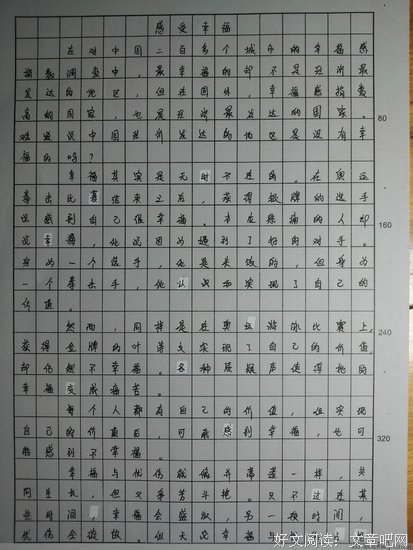《The Intelligent Investor》读后感10篇
《The Intelligent Investor》是一本由Benjamin Graham / Jason Zweig著作,HarperBusiness出版的Paperback图书,本书定价:USD 22.99,页数:640,文章吧小编精心整理的一些读者的读后感,希望对大家能有帮助。
《The Intelligent Investor》读后感(一):门外汉只看结论
作为投资门外汉,对金融市场不甚了解(更别说会主动行使股东权利)的人来说,只好站在巨人的肩膀上,翻翻结论看看,怎样做一个防守型投资者(书中另一半是写给进取型投资者的):
1、长期持有。
2、同时持有股票和债券。
3、股票选择多样化。
4、买指数基金。
5、公司过去的辉煌不代表将来。
6、如何选择股票:
a) 要有足够规模,〉$2billion
) 要有强的经济实力,资产>2*债务
c) 收益稳定
d) 看分红情况
e) 收益有增长,10年增长〉1/3
f) 适度的P/E, <= 15*ave(过去3年收益)
g) 适度的P/B, <1.5
《The Intelligent Investor》读后感(二):今天,这本书可能被高估了
前言中,巴菲特写到要想获得长期投资的成功,“What's needed is a sound intellectual framework for making decisions and the ability to keep emotions from corroding that framework. This book precisely and clearly prescribes the proper framework. You must supply the emotional discipline.”
从我自己的阅读来看,这本书恰恰没有“precisely and clearly prescribes the proper framework”,而是帮助我“supply the emotional discipline.”
最大的收获就是Mr.Market理论,当我们把市场看成一个情绪不稳定,每天都不厌其烦地告诉你一个买卖价格的Mr.Market的时候,就可以减少市场短期波动对我们情绪上的影响。
几十年前,单凭Mr.Market的说法的提出,就可以认为这是一本伟大的书。但是今天,如果想理解Mr.Market,我个人认为有其他更好的选择:
第一是Cunningham整理的《The Essays of Warren Buffett》,
第二是Seth Klarman写的《Margin of Safety》
我没有说The Intelligent Investor不好,但是在今天(注意,是在今天),可能被高估了,也可能是有很多有价值的内容我还没读出来。
《The Intelligent Investor》读后感(三):聪明的投资者版本信息整理
原文参见:
一、《聪明的投资者(the intelligent investor)》的版本
《聪明的投资者(the intelligent investor)》总共有5个版本,分别为:
1.1949年——第一版(First Edition)
2.1954年——第二版(New Revised Edition )
3.1959年——第三版(Second Revised Edition)
4.1965年——第四版(Third Revised Edition)
5.1973年——第五版(Fourth Revised Edition)
二、《聪明的投资者(the intelligent investor)》中文版各版本介绍
1.江苏人民出版社的简体中文版
共出过三个版次,根据内容来看,这三本这个版本应该属于1965年版,即第四版(Third Revised Edition)。
1999年和2000年的版次被译作《聪明的投资者》,2001年的版次译作《格雷厄姆投资指南》,这几个版次目前恐怕市面上只能买到二手书或者复印书。
2.寰宇出版社的繁体中文版《智慧型股票投资人》
基本可以确定此版本是1973年的第五版翻译过来的。
3.《科学与财富》出版社的简体中文版《聪明股票投资人》
此版本因为未获得授权,所以是《科学与财富》出版社以内部学习资料名义出版的,这一本是以1973年的版本翻译的,即第五版(Fourth Revised Edition)。
此版本和寰宇版主要为简繁版的区别,译者都为俞济群,除简繁区别外针对一些术语进行了更符合国内读者的调整。
三、其他
在证券分析的第六版序言中,巴菲特提到的四本珍藏的书为:《国富论》第一版、《聪明的投资者》第一版、《证券分析》第一版、《证券分析》第二版。
以上几本书,恐怕《聪明的投资者》第一版是没什么希望读到了,所幸,虽然有其他人的帮助,但《聪明的投资者》第五版仍然是格雷厄姆予以定稿的,这点应该可以弥补一些无法阅读第一版的遗憾。
此文如有遗漏或错误,敬请指正。
本文谨希望对有兴趣阅读《聪明的投资者(the intelligent investor)》一书的人起到一定的参考作用。
《The Intelligent Investor》读后感(四):Are you an intelligent investor?
With the unprecedented boom both in industry and in economy in China, enormously large amount of individuals spurred to set foot in financial market. It is no exaggeration that most of the people, including some business administration or economics majored graduates, lack experience of investment.
Virtually all of us long for the life of financial freedom, indicating the life of high quality without working, whereas merely few of us have acquired the methods of it. Investment, to some extent, helps us come closer to the object. The book written by Benjamin Graham precisely talks about the investor’s attitudes and investment principles. Graham was not only one of the best investors who ever lived, but also the greatest practical investment thinker of all time. Combining his extraordinary intellectual powers with profound common sense and vast experience, Graham developed his core principles, which are still valid today.
Graham laid much emphasis on traits investors need to cultivate since he regarded it as the most vital part when investing. According to his words, investors need to be patient, disciplined and eager to learn. They must also be able to harness emotions and think for themselves. This discipline can be applied to our daily life as well owing to its profound meaning. Only by doing things step by step can we finish the assignments perfectly. Only the well-organized people who also have a strong thirst for knowledge are likely to learn things thoroughly. Thus we’d better keep this discipline in mind for it genuinely benefit us a lot.
While the view that the art of successful investment lies first in the choice of those industries that are most likely to grow in the future and then in identifying the most promising companies in these industries has long been prevalent, paradoxically, obvious prospects for physical growth in a business do not translate into obvious profits for investors. A stock does not become a sound investment merely because of its optimistic future. The investor should demand, in addition, a stock price that is close to its asset value, a satisfactory ratio of earnings to price, a sufficiently strong financial position, and the prospect that its earnings will at least be maintained over the years. Hence, we can easily acknowledge that it is of paramount importance to conduct research of the companies before we bought its stock. Since comparatively flourishing business always issue share which is dependable, we can judge our company from the perspective of stock as well.
In a nutshell, Graham suggested the investors to establish the proper mental and emotional attitudes toward their investment decisions and to weigh the company’s tangible-asset value and their net-asset value. Additionally, he advocated a conservative and defensive investment policy when investing.
As business administration majored college students, we can use our specialized knowledge to analyze a company’s operation condition to help us earn profits in the financial market. More essentially, the same criteria should logically be applied in testing the effectiveness of a company’s management and the soundness of its attitude toward the owners of the business. It is believed that only good managements produce a good average market price, and vice versa. Therefore, we need to spare no efforts to organize and operate our business well, as well as to establish an appreciated and satisfactory price level for our shareholders when we start our own business in the near future.
《The Intelligent Investor》读后感(五):如何不当一个“愚蠢的投资者”
可以说,贯穿整本书,格雷厄姆所要告诉读者的是:如何不愚蠢地投资。在投资成功者的光环覆盖所有普通家庭,每个人都疯狂地认为投资即可赚钱的时代,这本书的内容却是告诉读者,什么样的投资会亏损,是愚蠢的投资,不要去效仿,然后才提及如何聪明地投资。
全书并没有涉及复杂的财务分析,高深的数学理论,仅仅通过简单的常识性的内容阐述如何避开愚蠢的投资行为,加入聪明的投资者行列。比如定期投资能够神奇地在1929年之后更快地弥补亏损,又比如小规模的分散投资就足够规避大部分市场的系统风险。超越这些“尽人皆知”的常识,后来的价值投资理论则和当今风行投资界的现代组合理论有点不兼容,或许这就是此书并不合所有人的胃口,以及价值投资理论从诞生至今,不停地被怀疑、驳斥、拥护的原因。我个人的看法是这本书的理论指引适合一部分(也许是大多数)投资者,也非常不适合另外一部分投资者,难点就在能否判断自己属于哪部分投资者。
格雷厄姆不厌其烦地对投资所需要的情绪和心理稳定性进行强调,一遍又一遍。这部分可以算是整本书的一个特殊亮点,称得上字字珠玑,每一句都闪烁着理性的光辉,值得反复阅读理解到烂熟于心,从而引导自己的投资行为乃至日常生活中的言行。可以这样诠释,聪明的投资者可以是那种有着与生俱来的投资本能的,也可以是在市场中日复一日年复一年浸泡磨练出来的,但是,有些人却永远无法成为一个聪明的投资者,这是人格心理因素所决定的。
书中的道理浅显,但不容易深刻领会。Simple but not easy. 总之我不太喜欢“华尔街教父”这个略嫌恭维的名号,对投资大师格雷厄姆的尊敬,更多地来源于他投资生涯中对商业社会里人性的把握,不论是他自己还是组成整个市场的投资者们。
或许中国人的民族性让我们不适合进行商业思考,我们更需要的是明白投资的真谛,什么才是财富的持续增值。复利的奇迹让投资取得巨大收益,平凡工作的每个人让复利得以成为奇迹。
《The Intelligent Investor》读后感(六):过程远比结论重要的多
最近看了些关于这书的评论,大致都是:此书中格雷厄姆的思想大致可以归类为两个,一个叫市场波动,一个叫安全边际。话虽如此。。这是一本古老得不停再版的书,里面说一般投资原理,多数人都知道了,呼喊着说“老子要学价值投资”,翻掉专门的那两章去看结论,有用么?
那这书看什么呢?这书说的一般投资原理,精彩之处在于,整本书里,作者不停地告诉你,“不应该这样做”的原因。作者的智慧通过点点滴滴,通过一版再版传了下来,至于结论么,第一,作者书里很明确的表示过了,这不是一本教你如何暴富的书;第二,无论如何这书的年代也在三四十年前了。。
然后对于每章结束后Zweig评论的语气不满。Zweig不停地说教我,“不应该这样做”(的结论),然后抓几个反派人物出来做典型,没啥意思。告诉我不该做什么,并且告诉我为什么,这样就行了。该做什么由我自己决定。认真通读下更好,得救之道在于此中-,=
《The Intelligent Investor》读后感(七):无聊之极,有理之至
这本书与市场上流行的其他投资经典(如Peter Lynch的One up on wall street)相比语言晦涩干燥,辞藻里更透露着这是一本古老的著作。全书我觉得可以总结为四个字:忠言逆耳。
如果说要说本书可以汲取的硬知识的话,那就是注重一个公司的intrinsic value. 这是基本面分析的最基本的但也是最容易被现在的投资者所忘记的。
我们中国市场的投资者(尽管大多数人并不符合作者对“投资者”的定义)整天嘴里不离各种均线、阴阳线、蜡、头、肩以及无数种指标。这就像一篇经典的名著被不断地用各种句式、语法肢解的七零八落。在做这些事情的时候我们往往忘记了我们做的事情的最本质的东西。股票这个东西本来在经济学里就被分类在储蓄这个门类下不是么?
另外我觉得作为一个投资者,最最重要的一点事做一个happy investor,而不是intelligent,享受投资这个过程,这才是我们应该做的啊。当然,想要享受投资,第一个要点就是不能把影响到自己生活质量的数量的资金投入到股市。
